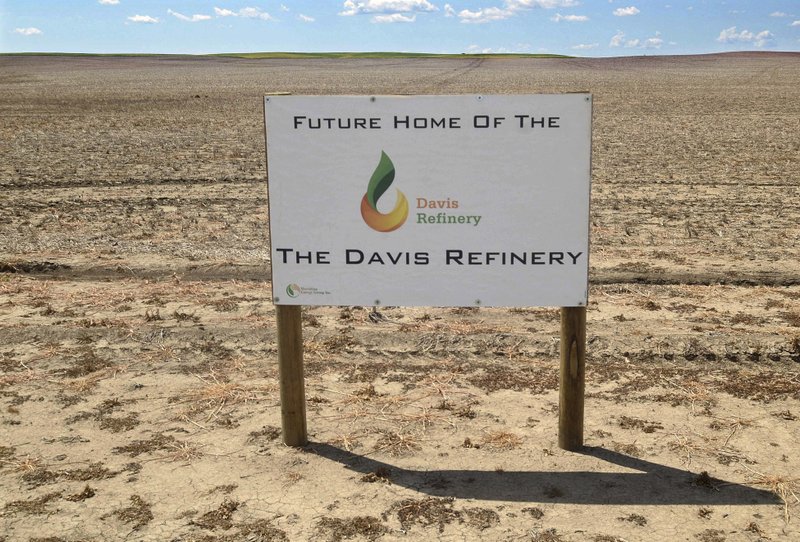
A sign on property, near southwest Belfield, N.D, for the future home of the Davis Refinery near Theodore Roosevelt National Park. (Photo: AP)
Opponents of an oil refinery planned near Theodore Roosevelt National Park in North Dakota are imploring state regulators to give them a chance to explore whether the developer is being truthful about the project’s size.
The Environmental Law and Policy Center and Dakota Resource Council filed the request Tuesday with the Public Service Commission, arguing that it’s the commission’s duty to “determine whether Meridian’s new claim is credible.”
Meridian Energy Group maintains it doesn’t need a state siting permit from the commission because the $800 million Davis Refinery planned 3 miles (5 kilometers) from North Dakota’s top tourist attraction will have a capacity of 49,500 barrels per day — just below the 50,000-barrel threshold that triggers a state review. However, the company previously gave a 55,000-barrel figure to the media, investors and government officials.
The Environmental Law and Policy Center and Dakota Resource Council maintain the commission should open a case and allow lawyers to investigate the true figure. The request is in the groups’ formal response to Meridian’s plea earlier this month that the commission throw out a complaint that the environmental groups filed in late June.
The issue of the refinery’s capacity “is precisely the kind of factual question that cannot be resolved on a motion to dismiss,” lawyers for the environmental groups argued.
Meridian has maintained that the 55,000-barrel figure came from as far back as 2 ½ years ago and is outdated. Meridian CEO William Prentice has submitted a signed affidavit saying the company has “no current plans” for any expansion beyond 49,500 barrels per day.
The environmental groups question whether the statement is “linguistic gymnastics” and whether Meridian is planning a “bait and switch” in which it builds a refinery and then applies for permission to expand beyond the state threshold after the plant is already in place.
Meridian maintains the commission has no authority under state law to wade into the dispute. The environmental groups dispute that.
“It would be nonsensical to hold that the PSC has jurisdiction over refineries with a capacity of 50,000 (barrels per day) but does not have the jurisdiction to determine if a specific refinery meets that threshold,” their attorneys said.
Meridian Energy Group maintains it doesn’t need a state siting permit from the commission because the $800 million Davis Refinery planned 3 miles (5 kilometers) from North Dakota’s top tourist attraction will have a capacity of 49,500 barrels per day — just below the 50,000-barrel threshold that triggers a state review. However, the company previously gave a 55,000-barrel figure to the media, investors and government officials.
The Environmental Law and Policy Center and Dakota Resource Council maintain the commission should open a case and allow lawyers to investigate the true figure. The request is in the groups’ formal response to Meridian’s plea earlier this month that the commission throw out a complaint that the environmental groups filed in late June.
The issue of the refinery’s capacity “is precisely the kind of factual question that cannot be resolved on a motion to dismiss,” lawyers for the environmental groups argued.
Meridian has maintained that the 55,000-barrel figure came from as far back as 2 ½ years ago and is outdated. Meridian CEO William Prentice has submitted a signed affidavit saying the company has “no current plans” for any expansion beyond 49,500 barrels per day.
The environmental groups question whether the statement is “linguistic gymnastics” and whether Meridian is planning a “bait and switch” in which it builds a refinery and then applies for permission to expand beyond the state threshold after the plant is already in place.
Meridian maintains the commission has no authority under state law to wade into the dispute. The environmental groups dispute that.
“It would be nonsensical to hold that the PSC has jurisdiction over refineries with a capacity of 50,000 (barrels per day) but does not have the jurisdiction to determine if a specific refinery meets that threshold,” their attorneys said.


